May 21, 2025 | 03:36 GMT +7
May 21, 2025 | 03:36 GMT +7
Hotline: 0913.378.918
May 21, 2025 | 03:36 GMT +7
Hotline: 0913.378.918
According to historical accounts, ATK Cho Don was once densely forested and sparsely populated. Both sides of the road between ATK Cho Don and ATK Dinh Hoa (Thai Nguyen province) are lined with ancient trees. In the midst of extensive forests and mountains is the revolutionary base where the State Party's leaders reside and work. At that time, the forest and its residents protected the officers, while the forest resisted the enemy.
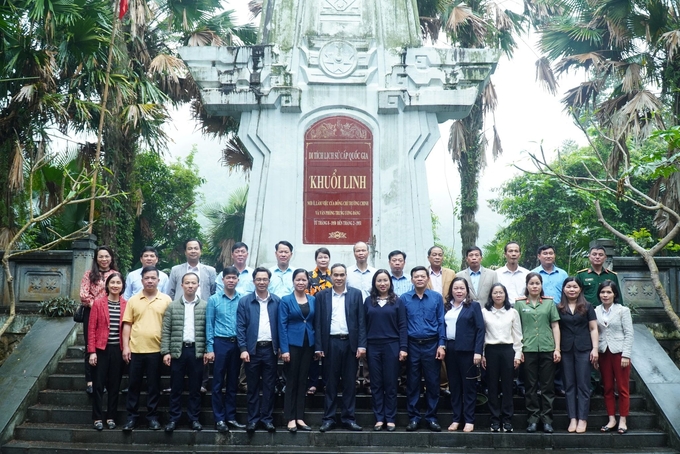
Khuoi Linh relic (Cho Don ATK) - the workplace of General Secretary Truong Chinh from 1950 - 1951. Photo: Quang Linh.
Life was difficult after the country's reunification in 1975 until the 1990s of the 20th century; wet rice cultivation was insufficient for consumption, people cleared fields for agriculture, and forests progressively disappeared.
Ancient forests containing large trees were cut down and burnt to create fruitful land for rice and cassava cultivation. After two harvests, the land ceased to be fruitful, and the inhabitants cut down another forest. The extensive forests were eventually depleted, leaving only weeds and boulders.
In the recollections of many people, it was once necessary to travel dozens of kilometers into the dense forest to locate a bundle of firewood. Every time it rains heavily, the forest becomes infertile, and silt overflows the village, inundating the fields and ponds. The fields were inundated by floods, harvests failed, and life became even more challenging.
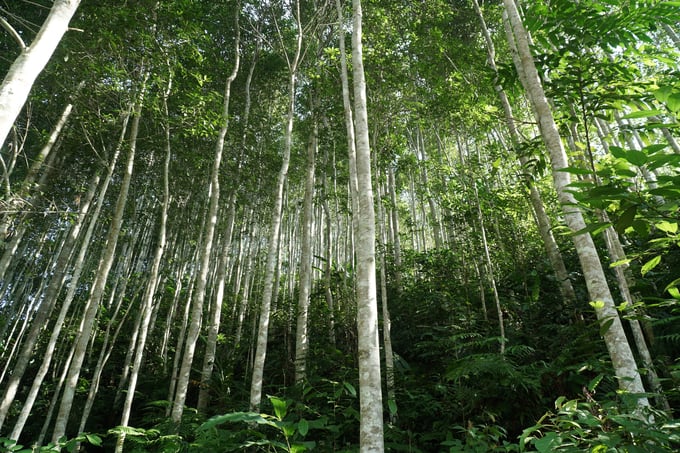
Vast planted forests in Binh Trung commune, Cho Don district today. Photo: Ngoc Tu.
The forest in Cho Don did not recover until the PAM initiative was implemented in 1997. People are actively planting forests, and bare slopes and summits are progressively becoming covered with more greenery.
However, forests still do not provide a great deal of economic value. At the time, people were anxious to plant forests in exchange for rice provided by the government to meet their immediate food needs, but few were concerned about how "healthy" the forest trees were.
The forests in the former war zones have not fully "awakened" and become "green gold" until the past fifteen years.
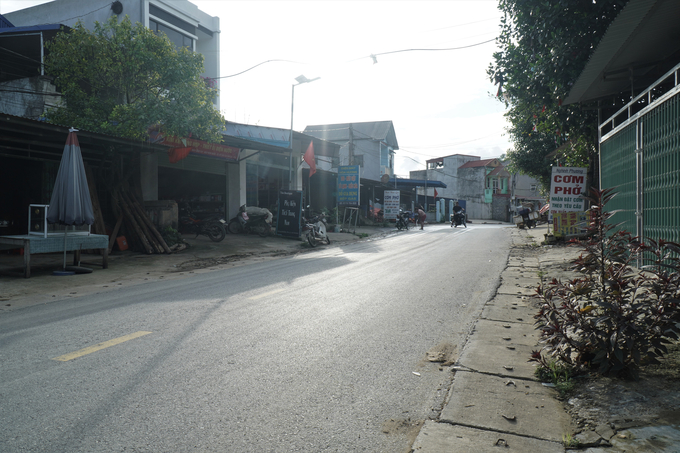
Binh Trung commune center today is changing rapidly. Photo: Ngoc Tu.
In the final days of August, we returned to ATK Cho Don, where the National Highway 3C passing through former conflict zone communes such as Binh Trung, Nghia Ta, Luong Bang, and Bang Lang had been widened, and along both sides of the road a growing number of dwellings could be seen. We see extensive forests as far as the eye can see wherever we go. Along the way, we occasionally encounter individuals sweating profusely while harvesting established forests for sale.
A decade ago, Binh Trung was a very impoverished commune, but now, everything has changed. Mr. Hoang Van Hy, Chairman of the People's Committee of Binh Trung commune, shared with great enthusiasm that the entire commune has nearly 5,600 hectares of production forest that the people have planted, resulting in a forest coverage rate of nearly 78%. There are also more than ten wood processing facilities and factories in the entire commune, including two wood processing factories that export to Taiwan and Japan. There are now numerous oligarchs in the community as a result of forest planting; some individuals own hundreds of hectares of planted forests, and there are innumerable households with a few dozen hectares.
No one in Binh Trung is unfamiliar with the two siblings Nong Van Chien and Nong Van Hoan when it comes to afforestation. Chien possesses close to 100 hectares of forest, while his younger sibling has over 30 hectares.
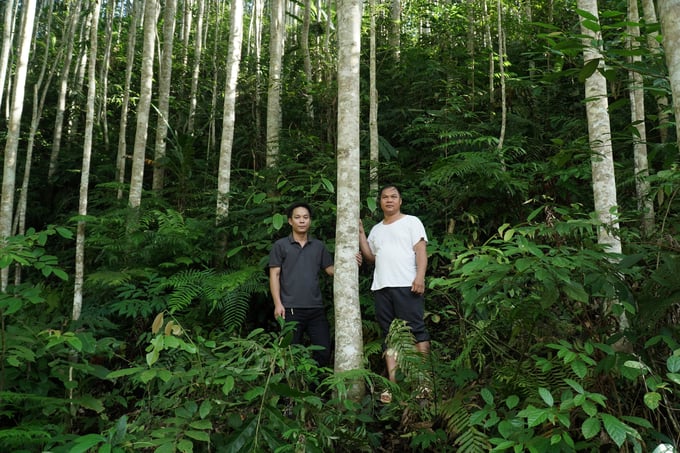
Mr. Nong Van Hoan (right) at his family's Magnolia conifera var. conifera forest. Photo: Quang Linh.
As a native, before 2007, like many other people in the village, Mr. Chien went to work as a worker in another province, but his salary was minimal, which did not help his life get better. In 2008, when he decided to return to his birthplace, he planted a forest as his first act.
Along the newly opened forestry road, which led us to the forest, Mr. Hoan explained that when he first returned from work, there were few people planting trees in the commune, so he had to figure out how to plant trees on his own. Afforestation is inherently difficult work, it rains early in the morning, and the payoff takes several years, so it is difficult for anyone who lacks persistence to succeed.
Now there are more than 30 hectares of forest, and everyone wonders why there are so many, but that is the consequence of his family's labor from 2008 to the present. The previous year, he sold 4 hectares of Magnolia conifera var. conifera for over 400 million VND, and he recently sold 3 hectares of acacia trees for an additional 200 million VND. He built a home, paid for his children's education, and continued to reinvest the remainder in the forest as he accumulated wealth.
Afforestation is not risk-free; for instance, a cluster of acacia trees can be devastated by a tornado, and the price fluctuates daily.
The expansion of the forest road network into the hills has made it possible for foresters to obtain sustenance, in part due to the growing market demand, but primarily as a result of the forest road network's expansion into the hills. Previously, paying for seedlings, and fertilizer, and then employing laborers accounted for more than half of forest growers' expenses. However, now that travel is more convenient, forest growers' profits have increased significantly.
Mr. Hoan's narrative about afforestation is ramping up, but we must part ways to visit another village in Binh Trung that is also considered the capital of afforestation.
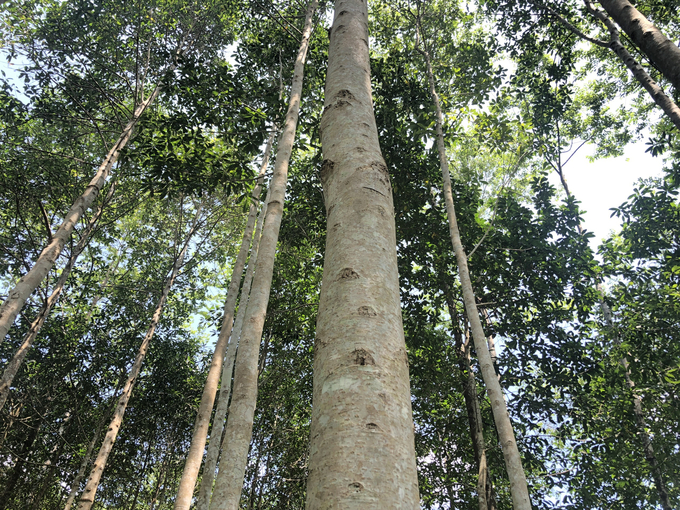
Planted forests in Na Quan village (Binh Trung commune). Photo: Ngoc Tu.
Today, when one visits Na Quan, the village appears more open, the streets and alleys are clean, and the people's livelihoods are progressively improving. Ten years ago, the entire village was impoverished, but now 17 out of 53 households have constructed sturdy structures. Several dozens of hectares of forest are owned by numerous households in Na Quan.
Translated by Linh Linh

(VAN) Japan's grant aid project contributes to capacity building, promoting organic agricultural production, and fostering sustainable community development in Dong Thap province.

(VAN) For years, the CRISPR-Cas9 genome technology has been reshaping genetic engineering, a precision tool to transform everything from agriculture to medicine.

(VAN) Vietnam aims to become a 'leader' in the region in the capacity and managing effectively soil health and crop nutrition.
![Reducing emissions from rice fields: [Part 1] Farming clean rice together](https://t.ex-cdn.com/nongnghiepmoitruong.vn/608w/files/news/2025/05/05/z6509661417740_a647202949c539012a959e841c03e1d3-nongnghiep-143611.jpg)
(VAN) Growing clean rice helps reduce environmental pollution while increasing income, allowing farmers to feel secure in production and remain committed to their fields for the long term.
/2025/05/19/5136-1-144800_230.jpg)
(VAN) The Nghe An Provincial People's Committee has just approved the list of beneficiaries eligible for revenue from the Emission Reductions Payment Agreement (ERPA) in the North Central region for the year 2025.

(VAN) 14 out of 35 domesticated elephants in Dak Lak province have had their living conditions improved, with 11 of them currently participating in the non-riding elephant tourism model.

(VAN) Muong Nhe Nature Reserve hopes that being upgraded to a national park will lay the foundation for forest protection efforts to be carried out in a systematic, modern, and sustainable manner.